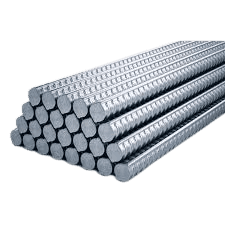Primary TMT Bar (rebar) is produced from MS billets through the blast furnace (BF) process, resulting in a pure and strong form of steel with no to fewer impuri...

Get Prices for Bulk Deals!
Primary TMT Bytes
Daily Market Report
View MoreSimilar Products
View MorePrimary TMT Tenders
| Product | Dimension | Grade | Location | Price | Last Updated |
|---|---|---|---|---|---|
| Primary TMT | 12 to 32mm | Fe 500D | Raigarh | INR 47,500 /MT | 07 Dec 2025 |
| Primary TMT | 12 to 32mm | Fe 500D | Raigarh | INR 47,500 /MT | 05 Dec 2025 |
TMT Bar is a popular raw material used in construction and infrastructure projects. Known for their high strength and flexibility, TMT bars are produced through a unique process that enhances their mechanical properties, making them ideal for various structural applications. This process involves heating the steel bars to a high temperature and then rapidly cooling them. This results in a unique microstructure that combines high strength and ductility.
Available in common sizes ranging from 8mm to 32mm, TMT bars are distinct due to their dual structure: a hard outer layer that provides strength and a softer inner core that allows for ductility. This combination makes TMT bars less prone to breakage during construction, ensuring structural integrity.
Fe 500/550D TMT bars are known for their lower carbon content, making them highly ductile. Their high tensile strength and enhanced elongation properties ensure they can withstand dynamic loads, including seismic activities. For instance, projects like the construction of technical buildings under the Military Engineer Services (MES) at Nagrota, Jammu, heavily rely on TMT steel bars for structural stability.
Additionally, TMT bars in coils ranging from 8mm to 16mm required in tenders like those from National Fertilizers Limited (NFL). There is a continuous demand for these materials in large-scale industrial and residential projects and various government tenders for TMT bars are released regularly.
Key Properties of TMT Steel
- High Strength: TMT steel has superior tensile strength compared to conventional steel, making it ideal for carrying heavy loads in construction projects.
- Ductility: It exhibits excellent ductility, allowing it to bend and stretch without breaking, which is crucial for absorbing shocks and vibrations in structures.
- Corrosion Resistance: The treatment process provides TMT with corrosion resistance, ensuring a longer lifespan for structures in various environmental conditions.
- Weldability: TMT can be easily welded, which simplifies the construction process and enhances the integrity of joints in structures.
Types of TMT
- Primary TMT: These are made from high-quality raw materials and undergo rigorous testing, ensuring superior performance in critical construction projects. Primary TMT is known for its high yield strength and is ideal for major infrastructure works. Primary TMT is produced by plants such as Steel Authority of India Limited (SAIL), Jindal Steel and Power Limited (JSPL), JSW Steel, Tata Steel, and Rashtriya Ispat Nigam Limited (RINL).
- Secondary TMT: These are typically produced from recycled materials. Secondary TMT steel bars are cost-effective alternatives for less demanding applications. They are largely suitable for residential buildings and smaller projects.
Significance of TMT in Construction
Primary TMT, especially Fe 500/550D grade, is essential for ensuring the structural integrity of buildings, bridges, and other constructions. Its strength and ductility help prevent failures during extreme weather events or seismic activities.
Although the initial primary TMT steel price may be higher than conventional steel, its durability and strength allow for reduced material usage in construction. This results in overall cost savings on materials and maintenance in the long run.
TMT steel is primarily used to reinforce concrete in residential buildings. The steel bars are embedded within concrete elements like slabs, beams, and columns. This reinforcement increases the tensile strength of concrete, which is naturally strong in compression but weak in tension.
TMT is a crucial material in bridge construction. It is used in both the superstructure and substructure of bridges, providing the necessary strength and flexibility to withstand dynamic loads, traffic vibrations, and environmental conditions. The use of TMT enhances the bridge's longevity and reliability.
TMT bars play a pivotal role in government and large-scale projects. For instance, ongoing projects such as the construction of residential accommodations for DAD officers and staff at Dharamshala, which involve significant use of Fe 500D TMT bars, ensure the structural integrity of the development.
Additionally, high-budget tenders like the Rs 22 crore MES tender in Jammu for technical infrastructure are perfect examples of where TMT steel bars are a necessity.
In West Bengal, the construction of AWC buildings in rural areas like Birbhum also highlights the importance of reliable TMT bars in building long-lasting infrastructure.
By using TMT, builders can ensure enhanced safety standards in construction. Its ability to withstand loads and resist deformation contributes to safer buildings and infrastructure.
TMT Prices
The primary and secondary steel prices in India can vary based on various factors, including market demand and production costs. Understanding the trends in primary TMT prices and secondary TMT prices can help businesses and consumers make informed decisions. To stay updated with the latest trends, traders should check 'steel rate today' on portals like Nexizo.
The primary TMT prices are the cost of TMT steel bars produced by leading manufacturers directly. These prices can fluctuate significantly based on market conditions. For those looking to buy them, checking the primary TMT price today is crucial to ensure you are getting the best rates.
In addition to primary manufacturers, there are also mild steel prices per kg, which pertain to TMT steel offered by smaller suppliers or distributors. These prices may vary from the primary market due to different sourcing and distribution costs. To keep track of budgetary needs, you might want to look up the secondary TMT price today or today's steel price.
TMT Historical Prices
TMT bar prices have corrected from mid-2025 highs and are now largely in the range of about ₹40,000–₹46,000/MT for bulk primary material in many Indian markets, with retail TMT steel rate per kg typically between ₹55–75/kg depending on brand, size, and location. Overall, steel prices today remain volatile, but most analysts expect MS steel price and TMT prices to move within a moderate band through late 2025, supported by infrastructure demand and cautious trade policies. After hovering in the ₹55,000–₹60,000/MT range in late 2023 and early 2024, prices softened as import pressure increased and demand normalized, before stabilising closer to the mid-₹40,000/MT zone by late 2025 for primary TMT in bulk trade.
In Q4 2024, TMT bar prices (FOB India) were reported to be 3–7% lower year-on-year, reflecting global oversupply and weaker export realisations. Through 2025, primary TMT prices have generally traded inside a projected band of about ₹50,000–₹58,000/MT on the back of infrastructure demand and raw material costs, even though spot market deals and secondary material have often been available at lower levels around ₹40,000–₹46,000/MT.
TMT Rates Today
Steel price today in India depends heavily on city, brand, and diameter, but current indications show bulk steel around ₹40,600/tonne on commodity benchmarks, with local TMT bar rates higher due to value addition and distribution margins. In major urban centres, the typical TMT steel rate today ranges roughly from ₹43,000–₹49,200/MT at the retail level, with cities like Delhi, Mumbai, Bengaluru, Chennai, Hyderabad and Kolkata quoting within this band.
Today steel price can vary depending on location and supply conditions. The shortage in supply is attributed to the maintenance work at SAIL ISP facilities, which is expected to influence future price hikes.
For example, recent listings show TMT 12mm prices around ₹43,000–₹48,900/MT in cities such as Raigarh, while Noida TMT bar prices are ₹48,700 per ton, depending on product and supplier. Secondary TMT offers, such as Fe 500 material in Raigarh and Durgapur, are currently visible around ₹38,900–₹40,000/MT, offering buyers a discount compared to primary brands. These levels effectively define the practical floor for ms steel price per kg and ms steel price in many regional markets.
For the latest updates on primary, including SAIL TMT and secondary TMT price today, please visit our pricing section. There, you can also check the MS steel price per kg.
TMT Price Forecast
TMT bar price today is also influenced by import flows and policy expectations, including concerns around Chinese steel imports and possible adjustments to import duties to limit under‑priced inflows. Ongoing global steel production moderation, reflected in international steel futures trading around 3,100 CNY/tonne with recent minor declines, continues to shape sentiment for Indian steel rate and today steel price.
Analysts tracking the segment expect that, for the remainder of 2025, primary TMT prices will mostly remain in a range of roughly ₹50,000–₹58,000/MT, supported by infrastructure and construction demand but capped by global competition and cautious buying. For the most accurate, location-specific TMT and ms steel price per kg, including SAIL and other primary/secondary brands, it is recommended to check live digital platforms like Nexizo and city-wise rate trackers on the day of purchase.
With the global slowdown in steel production, local markets are expected to face more supply-side constraints, pushing prices of TMT up. However, demand slowdowns due to the holiday season might temporarily stabilize rates.
To get the most accurate and competitive primary TMT prices, check the Nexizo platform regularly.
Factors that Influence TMT Prices in India
TMT prices in India are influenced by several factors:
- Global Steel Production: Changes in production levels in leading countries like China and India directly affect the supply of steel, influencing TMT rates.
- Raw Material Costs: The cost of raw materials such as iron ore and coal significantly impacts TMT prices. Any disruptions in mining or logistics can cause price fluctuations.
- Domestic Supply Constraints: Maintenance schedules of major steel plants, like the SAIL ISP plant in Raigarh, can lead to shortages, which in turn push prices higher.
- Demand Fluctuations: Seasonal demand patterns, including the construction slowdowns during holidays, can influence the market.
- Government Policies: Changes in import/export tariffs such as the recent tariffs imposed on Chinese imports, or infrastructure spending can either increase or decrease demand, impacting pricing.
Keep an eye on daily updates on Nexizo, as TMT prices can change based on global market trends and local supply chain issues.
Why Choose Nexizo for TMT?
Nexizo provides you with the highest quality primary TMT bars in India at competitive prices. With Nexizo, you can stay informed about the latest TMT bar price and market trends for both primary and secondary TMT bars. You can also take advantage of significant savings by buying in larger quantities.
Nexizo always ensures that the TMT bars meet the necessary quality standards, regardless of whether you are looking for primary TMT or secondary TMT.
Further, our team is here to assist you in selecting the right TMT bars for your specific needs. Nexizo has the TMT bars you need, be it a large infrastructure project or a small residential build. Contact us today for a personalised quote and expert advice.

%2Fhttps%253A%252F%252Fofbadmin.s3.ap-southeast-1.amazonaws.com%252Fnexizo%252Fproduction%252Fstrapi%252Ftmt_1_1a98e45017.png&w=3840&q=75)
%2Fhttps%253A%252F%252Fofbadmin.s3.ap-southeast-1.amazonaws.com%252Fnexizo%252Fproduction%252Fstrapi%252Ftmt_2_5a918fa09f.png&w=3840&q=75)
%2Fhttps%253A%252F%252Fofbadmin.s3.ap-southeast-1.amazonaws.com%252Fnexizo%252Fproduction%252Fstrapi%252Fstainless_steel_4_5c962d3e80.png&w=3840&q=75)
%2Fhttps%253A%252F%252Fofbadmin.s3.ap-southeast-1.amazonaws.com%252Fnexizo%252Fproduction%252Fstrapi%252FMild_Steel_4ea69f4691.png&w=3840&q=75)
%2Fhttps%253A%252F%252Fofbadmin.s3.ap-southeast-1.amazonaws.com%252Fnexizo%252Fproduction%252Fstrapi%252Ftmt_3f051e2fb7.png&w=3840&q=75)
%2Fhttps%253A%252F%252Fofbadmin.s3.ap-southeast-1.amazonaws.com%252Fnexizo%252Fproduction%252Fstrapi%252Ftmt_4_855334dcb0.png&w=3840&q=75)
%2Fhttps%253A%252F%252Fofbadmin.s3.ap-southeast-1.amazonaws.com%252Fnexizo%252Fproduction%252Fstrapi%252F16493_1317_image_0_d2f7b743ad.jpg&w=3840&q=75)
%2Fhttps%253A%252F%252Fofbadmin.s3.ap-southeast-1.amazonaws.com%252Fnexizo%252Fproduction%252Fstrapi%252Fhot_rolled_steel_coil_roll_o0_Q4an9_600_fe306f6654.jpg&w=3840&q=75)
%2Fhttps%253A%252F%252Fofbadmin.s3.ap-southeast-1.amazonaws.com%252Fnexizo%252Fproduction%252Fstrapi%252FCRC_cec6577b20.png&w=3840&q=75)
%2Fhttps%253A%252F%252Fofbadmin.s3.ap-southeast-1.amazonaws.com%252Fnexizo%252Fproduction%252Fstrapi%252FHR_Plate_4c9d03721e.png&w=3840&q=75)
%2Fhttps%253A%252F%252Fofbadmin.s3.ap-southeast-1.amazonaws.com%252Fnexizo%252Fproduction%252Fstrapi%252FGI_Coil80_GSM_0_80mm_050acad7cb.png&w=3840&q=75)